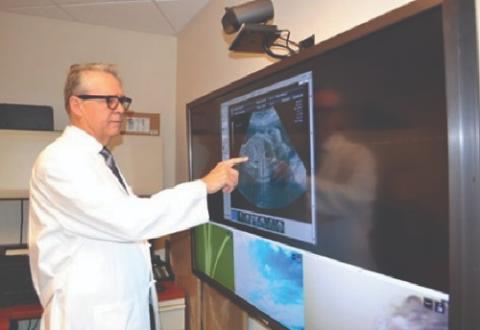VA Sierra Pacific Network (VISN 21)
Bringing New Technology to the Pacific Islands

Dr. Curtis Lowery, associate chief of research and development at VA Pacific Islands Health Care System (VAPIHCS), taken as the Doctor was reviewing a fetal ultrasound.
Dr. Curtis Lowery, associate chief of staff for the department of research and development, has spent his life helping women. Before coming to the VA Pacific Islands Health Care System (VAPIHCS), he worked at the University of Arkansas, where he made significant advancements in Obstetrics-Gynecology (OBGYN) care. Now, he’s won a VA Innovation Grant that will allow him to bring remote ultrasound technology to the Pacific Islands.
“There is an unfortunate inequality in the distribution of care,” Dr. Lowery said. “The more urban islands have greater access to technological equipment in health care, while less rural islands do not have access.”
The new machine, called ‘MELODY,’ was originally developed by a French company. It is already being used in other countries, including Canada and France. However, the unit coming to VAPIHCS will be the first to be used in the United States. MELODY is a robotic telemedicine solution which allows an experienced doctor to operate ultrasound equipment remotely.
Unlike a blood pressure cuff or a scale, ultrasound equipment isn’t easy for a novice to use. In fetal medicine, an experienced doctor can be the difference between life and death. It’s not possible to have someone on every island in VAPIHCS who has the necessary experience. Therefore, it is often helpful to utilize telehealth modalities to get quality care to patients in places like Saipan or American Samoa. VAPIHCS has already deployed Accessing Telehealth Through Local Area Stations (ATLAS) booths for health checkups, as well as Audiology booths that allow telehealth appointments with an Audiologist. MELODY is the next step in the efforts to allow accessibility of care to every Veteran in VAPIHCS, helping them get care closer to home instead of traveling to Honolulu for appointments.
“This is a technology that could have applications in rural areas of the mainland as well,” Dr. Lowery said. “Patients in rural areas wouldn’t need to drive for hours to get to a facility where the care they needed was available. If their local facility had MELODY, a doctor from somewhere else could log in to that machine and help the patient without anyone needed to travel.”
MELODY isn’t just for fetal ultrasounds. The machine can be used by a Cardiologist to perform an echocardiogram, or by a Nephrologist to do a renal ultrasound. There are many different potential applications because a variety of specialists could operate the machine. In this way, Dr. Lowery hopes that Veterans will be able to access more aspects of specialist care without having to travel.
There are two parts to a MELODY unit. One part is the control Room, which will be installed on Oahu. The second part is the ultrasound machine itself, which is equipped with the remote access technology. For this test of the system, the ultrasound machine will be installed in the Hilo Community Based Outpatient Clinic (CBOC). If it meets expectations, the hope would be to install remote access ultrasound equipment on other islands in VAPIHCS in the future.
“Getting the VA Innovation grant was wonderful because the cost of the robot is significant,” Dr. Lowery said. “I’m excited to be selected for the grant, and excited to see MELODY installed when it arrives.”
Dr. Lowery is originally from Alabama, and he went to medical school at the University of Alabama before doing a fellowship in Charleston, South Carolina. Most of his career was spent doing research at the University of Arkansas. However, the climate in the Southeastern United States shifted towards restrictions on women’s health care that Dr. Lowery felt inhibited his ability to provide effective care to patients. When he decided to come out of retirement, he looked for somewhere with more favorable views. He first went to the University of Hawaii, but it didn’t take long for him to be recruited to VAPIHCS.
Dr. Adam Robinson, director VAPIHCS, approached Dr. Lowery about working in the Research and Development Department, and Dr. Lowery was glad to accept. He is currently working on several exciting projects that have the potential to help Veterans in the Pacific Islands. Additionally, the Research and Development Department has two vacancies, and they hope to hire more qualified researchers to expand the department in the future. There will undoubtedly be more news on innovations coming from them in the future.
“With the development and application of newer and better technologies we can begin to equalize the delivery of care in the Pacific Islands,” Lowery said. “I hope to assist in facilitating that process. I think there are many new tools, such as Artificial Intelligence (AI) diagnostics programs, which will be useful tools to aid doctors of the future as we move towards a reality where technology augments and enhances more of the care process.”
Of course, there is no substitute for the human touch. Dr. Lowery is excited for better equipment and better ways of delivering care, but he also says that there will never be a substitute for the insight and experience that a trained physician can provide. He thinks of technological advancements as something to be used in partnership with experienced physicians to provide a level of care that couldn’t be achieved without both the human and the machine. When MELODY is installed in November of this year, VAPIHCS will get to test out one such partnership, and hopefully the results will provide the proof of concept needed to expand the program to other areas where such technology is needed.
Video:
MELODY Technology
















